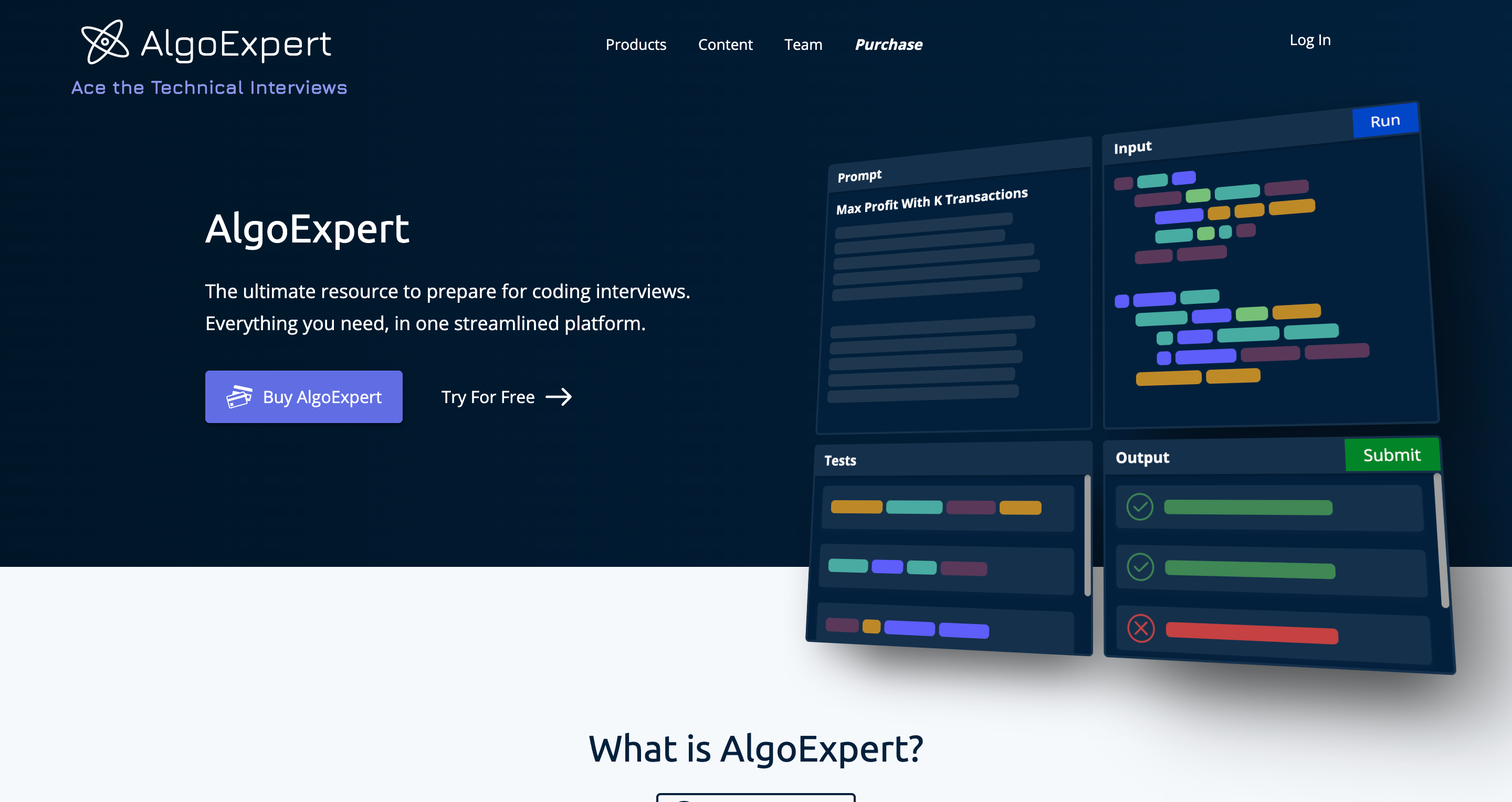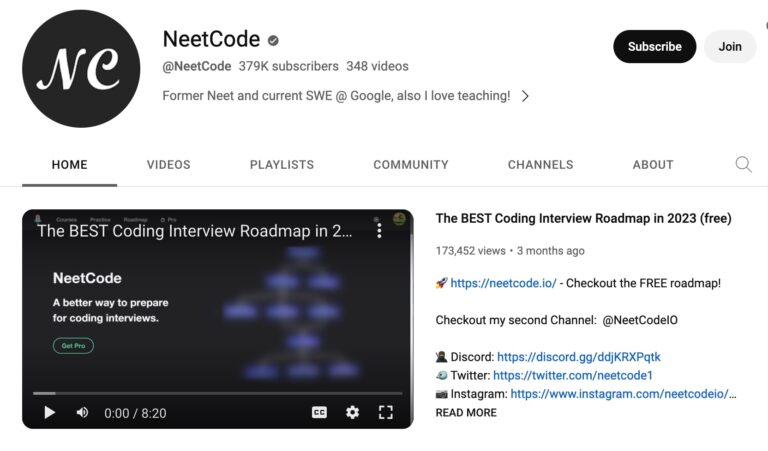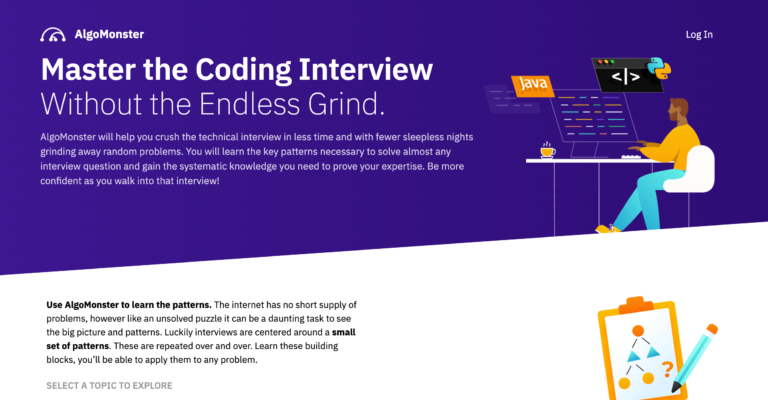Interview Kickstart vs. Algoexpert – Which is Better?

Interview Kickstart and Algoexpert are well-known platforms for software engineers looking for a tech interview prep course.
They are both owned by industry-leading experts who have worked in FAANG companies like Google and Facebook.
They even have an enviable track record of helping thousands of their students each year land jobs in big tech companies
However, they take very different approaches to doing their job as prep platforms.
And that’s why we are on this page. To see what their differences in approach to study can mean for you.
In other words, you’ll be able to discern without any doubt which will work better for you.
Without further ado, let’s get into it.
Interview Kickstart Overview
Interview Kickstart is a tech interview boot camp designed to show software engineers the way through technical interviews.
The platform was established in 2014 by Soham Mehta and Ryan Valles and continues to produce professional software engineers who eventually find their way into top tech companies.
Interview Kickstart is an online platform. It handles its programs and coaching like an online college.
The classes are held in a live format but not in a physical classroom.
Classes are interactive as a result. You can see the instructor and the rest of your colleagues and participate as much as possible.
The training consists of technical coaching, practice problems, workshops, homework, mock interviews, and so on.
Courses in Interview Kickstart are domain-specific. Before joining the platform, you must have specialized in a field of software engineering or at least be planning your specialty.
There are also individual sessions through which you can receive one-on-one assistance on your homework and tips on improving your performance.
How about the scheduling? Interview Kickstart (IK) is flexible with that.
Whether you are a worker or not, you can find a schedule that fits into your daily routine.
Most classes are scheduled for evenings and weekends, so the probability of not having time is slim.
At the end of your program, which typically lasts for two months, you get six months of support, during which time you can always hop on the platform for guidance on the next step to take in your career.
Algoexpert Overview
Algoexpert is an online training platform for software engineers as well.
Its founder is Clement Mihailescu. He has been in the shoes of candidates who have been preparing for technical interviews the hard way.
On Algoexpert’s site, there is a video in which he recounts how he used to use books, academic PDFs, and YouTube videos to prepare for Google’s coding interviews.
He discovered that learning coding through the solutions you find in a book is very difficult. It becomes even worse when these solutions are written in a programming language you aren’t familiar with.
To further complicate matters, you would need lots of additional research to understand the solutions. So you’d be spending much time without getting much in return.
And he felt there had to be a better and easier way to approach tech interview prep.
Algoexpert is the result of his efforts.
Algoexpert is built around Clements’s idea of having the means to study relevant questions on data structures and check if your solutions are correct.
The platform also features detailed explanations of every single solution to the problems presented for study.
One good thing about the solutions is that they are written in various programming languages. That way, the frustration of studying in a foreign language can be eliminated.
The bulk of the training you’ll receive consists of up to 160 questions on various coding topics from arrays to stacks.
The training is given through pre-recorded videos that go deep into each topic.
We’ve got a detailed overview of both platforms. Next, we will quickly summarize the key points in a comparison table.
Interview Kickstart vs. Algoexpert—Comparison Overview
Creator/Instructor/Founder | Interview Kickstart Soham Mehta | Algoexpert Clement Mihailescu |
| Duration | Two months | N/A |
| Price | $5600 | The lowest price is $39 and can go up to $87 depending on your course bundle |
| Features | Broad curriculum Mock interviews One-on-one assistance Personalized feedback Career Coaching Salary negotiation | 100+ Practice Questions Data Structures Content Guided Format Coding Workspace Multiple Programming Languages Curated Assessments Video Explanations Mock Interviews |
| Premium community | Yes | No |
Interview Kickstart vs. Algoexpert Course Outline
Interview Kickstart and Algoexpert, as we have already seen, provide training for software engineering candidates.
While the training is similar in some respects, how both platforms deliver them is not the same.
Interview Kickstart has a course outline for each domain-specific course.
A domain like a back-end engineering, for example, has a different course outline from, say, iOS engineering.
But one common feature of all the courses is training in data structures and algorithms (DS&A)and system design after that is career coaching which lasts for six months.
Algoexpert diverges from that scheme. And its plan leaves out system design.
The only element of software engineering aside from coding that Algoexpert has a full-scale outline for is data structures and algorithms.
Then for each of the 160+ practice problems, there are explanatory videos.
Now, I’ll move right away into their respective course outlines and features.
Interview Kickstart Course Outline
Interview Kickstart has up to 17 courses in each software engineering domain.
These courses cover domain training, systems design, and coding.
But their primary objective is to prepare candidates for the various sections of their interviews.
Here is a list of the courses they offer:
Back-end Engineering
The back-end engineering course curriculum covers data structures and algorithms for five weeks and system design for three weeks.
Then it dives into the domain proper for five weeks.
The domain is meant for backend developers and covers aspects like SQL, NoSQL, object modeling, API, Cloud Native Design, and Concurrency.
The course module prepares students for the initial technical screening, the behavioral interview, and rounds of general and specialized coding.
Full-Stack Engineering
This is the domain that concerns full-stack engineers/developers.
The course prepares candidates for the interview sessions, which include theoretical technical screening, behavioral rounds, and then on-site practicals.
Like the back-end engineering domain, the course treats DS&A for five weeks before diving into the field.
The domain addresses API design and implementation, JavaScript and Web development, and UI system design.
Front-end Engineering
Front-end engineering is a module for front-end/UI engineers and full-stack developers.
The usual suspects are also treated here; I mean DS&A and system design.
The core front-end engineering training takes learners through JavaScript language and libraries, UI and DOM, advanced CSS techniques, et cetera.
The front-end engineering interviews follow the technical screening—behavioral—on-site format.
Engineering Manager
The engineering manager module aims to help students nail the engineering manager interviews at FAANG and Tier-1 companies.
The instructors are software engineers and engineering managers in top companies as well.
The course is meant to train prospective managers in technical and human relations skills like motivation, team and culture, et cetera.
Data structures and algorithms come later.
Current or former senior engineering managers are the usual applicants.
Early Engineering
Early engineering is meant for people who are newbies in software engineering.
They might be fresh graduates or software engineers with a few years of experience.
The module covers the foundational topics in software engineering, e.g., sorting, recursion, trees, graphs, and dynamic programming.
People who apply for this course usually become junior software engineers or assistants.
Embedded Systems
Embedded systems involve a combination of computer hardware and software designed for a specific function.
The concept has a wide range of applications in computer systems.
Candidates are usually software engineers working or aspiring to work in semiconductor or system companies who want to hone their skills.
The module consists of live sessions covering such topics as microcontroller units, programming for embedded devices, et cetera.
Machine Learning
Machine learning is a crucial aspect of artificial intelligence.
It is what makes our gadgets, from smartphones to desktops and smartwatches, able to adapt to our usage patterns and predict what next we might need from them.
It is also the concept behind the functioning of chatbots that lightens the load of customer care in any organization.
The primary topics in this course are supervised learning, unsupervised learning, and deep learning.
You’ll want to apply for this course if you are eyeing a position that will see you working with electronic machinery.
Data Engineering
Data engineering, in simple terms, is the process of designing and building machines that help collect, analyze, implement, and store data.
Data engineers are instrumental in any organization. A lot of raw data is received every day, and we need data scientists to help interpret that data so it can be helpful.
Data engineering builds systems for collecting data which is why the course on IK features training on system design.
And, of course, there is data structure and algorithms, all of which a data engineer cannot do without.
Site Reliability Engineering
SRE is a valuable practice that comes into play when creating scalable and highly reliable software systems.
It helps you manage large systems through code, which is more scalable and sustainable for admins managing thousands or hundreds of thousands of machines.
It is in this module that mention is made of popular software frameworks like Linux system, networking, HTTP, DNS, TCP/IP, the OSI Model, et cetera.
iOS Engineering
iOS engineering takes care of the production and optimization of apps for the AppStore.
iOS engineers are at the center of the action, improving and refining the experience of iOS devices.
The module trains you to nail the interviews at Apple, a FAANG company.
It consists of a total of twelve weeks of training on such topics as UI design with Swift or UIKit, app life cycle, concurrency, data sharing, et cetera.
Android Engineering
Android is the biggest mobile platform in the world. It is the favorite child of Google, a FAANG company.
It is not hard to see why software engineers are in high demand for the role of Android engineer.
Applicants for the role of Android engineer usually have experience in software engineering.
It’s better that way because a newcomer to the world of software engineering would have difficulty catching up with the advanced coding and other technicalities the average Android engineer must have mastered.
Test Engineering
Test engineering is the kind of engineering that makes the final checks of quality for a product.
A test engineer uses the best process to confirm if a particular software or hardware meets the standards.
The test engineering curriculum includes the following topics:
- Quality engineering foundations
- Performance, stress, and Agile testing
- API Testing
- Test Automation Frameworks
- Test Automation Design Pattern
- Cloud Testing
Technical Program Manager
A technical program manager manages one or more company projects.
They monitor every stage of the project from start to finish. Amongst other things, they define project requirements and evaluate the finished products.
The current IK curriculum for Technical Program Managers aims to equip program managers with the skills needed to do their job well.
The curriculum contains such topics as program planning, program execution, program monitoring, and reporting, introducing frameworks, FAANG values and motivation, and so on.
Data Science
Data science is an extensive branch of science.
Data science involves everything from collecting data to analyzing it to build products, solve problems, reach conclusions, and so on.
Data scientists are in high demand because they turn raw data into actionable insights. Of course, you can’t do anything with data if you can’t make sense of it.
The data science curriculum covers topics ranging from probability and distributions to supervised and unsupervised ML.
It is also in this module that deep learning and time series analysis will feature.
Product Manager (Tech)
A product manager oversees the entirety of a product from the concept to the finishing point until it gets to the final consumer.
The success or failure of a given product can be traced back to the product management and whoever was in charge.
If you are interested in enlisting IK’s assistance for product manager interview prep, you can expect the following topics below.
The first is system design. This is followed by the core product management topics such as
- Product sense
- Product execution
- Technical product
- Teamwork and influence
- Communication and problem solving
- Adaptability and Handling Conflict.
As you can see, there is a touch of project management skills in the curriculum.
That’s because product management is also a branch of project management. You will not learn technical skills but organizational and interaction skills as well.
Security Engineering
Wikipedia defines security engineering as incorporating security controls into an information system so that the rules become an integral part of the system’s operational capabilities.
Security engineers are at the helm of keeping the company’s security in top shape.
Amongst other things, they implement and test new security features and plan computer and network upgrades.
Inside the course curriculum, much attention is given to security-related features like Applied Cryptography and Information Security, Secure System Design and Security Policies, et cetera.
AWS Cloud Solutions Architect
You don’t need to be a software engineer to know that “cloud” is software terminology for delivering software facilities over the internet.
These facilities can be network, storage, and so on.
AWS codes for Amazon Web Service and is a global hub for cloud solutions with a diverse range of applications.
To work as an AWS cloud solutions architect requires knowledge in such aspects as Linux and networking, cloud security practices and architecture, et cetera.
All that and more you will encounter in IK’s curriculum for the AWS prep.
Algoexpert Course Outline
Having gotten the hang of what to expect from IK’s course curriculum, let’s turn our attention to Algoexpert.
Like I said earlier, Algoexpert’s curriculum covers data structures and algorithms alone.
Besides, it’s not a curriculum per se, just a list of topics in coding and data structures on which the practice questions are based.
The training is built around self-practice. And then, there are explainer videos on the topic the question represents.
And if you want to learn system design with algoexpert, you will pay extra.
So here we go with the list of topics:
1. Arrays
Arrays are a computing term that has to do with data arrangement.
It involves grouping data elements of a similar nature, making them easier to find and work with.
There are many practice problems on Algoexpert that deal with arrays.
2. Graphs
Graphs are ways of representing the relationships between data objects.
They are one of the fundamental ways of representing information that the average software engineer must know.
Graphs are how many digital services like social networks store information and fetch them with high accuracy when needed.
Algoexpert contains lots of sample interview questions on graphs and their applications.
3. Tries
The above may seem like a typo, but a software engineer will know it’s not.
It simply refers to a type of data structure that, in turn, is a way of organizing data.
4. Linked Lists
A linked list is a sequence of data structures where each one is connected to the next.
It is a prevalent method of organizing data, second only to arrays.
Linked lists also have a variety of real-life applications. For instance, the next and previous buttons used to switch between web pages or images in your gallery follow the principle of linked lists.
5. Binary Trees
Binary trees are data structures usually with elements such as roots and nodes.
Binary trees are mainly used for searching and sorting as they provide a means to store data hierarchically.
Binary trees have many applications, and Algoexpert is there to help you out.
6. Strings
A string is a way that a particular programming language is written.
Strings are usually made up of characters and can be as long or as short as possible.
Strings are one of the essential things to learn in programming because they are so common. We use some forms of strings every day when typing, for example.
7. Dynamic Programming
Dynamic programming is a way to simplify and solve problems in code.
A professional in dynamic programming knows how to use algorithms to break down complex coding problems into subproblems.
Then the optimized solution can be used by programmers to solve the entire problem.
8. Searching
Searching is a computing jargon that means locating an element in a given set of features.
Search algorithms are typically used to solve search problems.
Search problems usually vary in difficulty, but with the sample problems on Algoexpert and the video explanations of the solutions, you can hit the ground running.
9. Sorting
Sorting is all about the arrangement and rearrangement of items systemically.
In sorting, you can either arrange items in a sequence according to criteria or group items with similar properties.
This and more you will learn when you join Algoexpert.
10. Greedy Algorithms
Greedy algorithms is another topic you’ll catch up with in Algoexpert.
It is an approach to solving computing problems that software engineers are familiar with.
The idea behind the algorithm is to solve a problem by selecting the best option available at the moment.
In Algoexpert, you will learn what kind of properties a problem must have before you can apply greedy algorithms to it and more.
11. Recursion
Recursion is included in the list of topics Algoexpert addresses as part of the interview prep.
Recursion is a famous computing trick among software engineers. It involves solving a significant problem gradually by providing solutions to smaller types of the same problem.
That’s just a basic explanation of what recursion is all about. There is much more to it. So if it’s one of your weak areas, Algoexpert is an excellent place to consider.
12. Famous Algorithms
This is not a kind of algorithm in itself but is a collective term for the most popular types of algorithms in use.
They include the divide-and-conquer algorithm, search algorithm, counting sort algorithm, hash function, etc.
This section is focused on all those kinds of algorithms mentioned above and a lot more.
So you can expect a fully-loaded tutorial on them.
Interview Kickstart vs. Algoexpert—Pricing
You’ll agree that pricing is a major deciding factor when making your choice.
You want to be sure that you are getting as much as or a little above what you paid for.
And another thing is that, even if you didn’t get the desired results, you’d be less hurt if you paid less than if you paid a considerable sum of money.
This takes us to the question of which platform’s pricing is better. Follow along with me.
Interview Kickstart Pricing
Interview Kickstart is paid once. In other words, there is no recurring billing.
But in that one-time payment, you’ll be paying up to 10× what other platforms like Algoexpert demand.
This is the breakdown:
Trial—$600
Complete package—$5600.
If you do the maths, you’re paying $6200 for both the trial and the package.
That’s equivalent to what some universities charge for a semester!
Algoexpert Pricing
Algoexpert’s pricing is way cheaper but is paid yearly. This is how it goes:
Algoexpert bundle (data structure and algorithm alone)—$39 annually.
Tech Interview bundle (the above plus systems design)—$62 yearly.
Which Interview Prep Course for Software Engineers is Better?
We’ve learned a lot about how these two platforms conduct their training.
We’ve gone through their overview and, of course, their course outline.
And now, I’m sure the next thing on your mind is, which interview prep course is better?
The answer is not so clear-cut. At least not only do we dive deeper into their strengths and weaknesses each other.
I will start with Interview Kickstart.
Pros of Interview Kickstart
1. The platform is known for giving intensive training for domain-specific subjects.
2. The crucial areas for a software engineer are covered. They are data structure and algorithm, coding, and system design.
3. Interview Kickstart has a strong track record regarding success rates in tech interviews.
4. Many extras like mock interviews, career coaching, and salary negotiation are included in the package.
Cons of Interview Kickstart
1. Little or no attention is given to the communication aspect, which is the most crucial aspect of any training.
Communication skills involve your ability to communicate well with colleagues and express yourself effectively.
Take teamwork as an example. You need to be able to work with others to achieve a common objective since it’s not only you that the company is relying on.
You can now see why it’s essential that your coaching platform of choice has communication skills in its curriculum.
2. Interview Kickstart’s program is very pricey. At $5600 (excluding a trial of $600), it is one of the most expensive courses.
3. If you are fresh from college and want to prep for a tech interview from scratch, you’d be better off elsewhere.
IK is not for beginners. You must have at least two years of experience in a domain of your choice.
4. While IK offers personalized guidance and training, it doesn’t yet provide individual resume reviews.
5. There is a disadvantage to IK using virtual live classes for its programs. Once your term has expired, you can’t regain any access to the training.
All you’d have to rely on is the six months of extended support and your notes.
6. No resume review. Nobody will have your time to sit down and scan through your resume free of charge, if at all.
That’s one thing I bet is of prime importance. Many candidates don’t know how to structure their résumés well. They either go off track or falter in some other area.
Let’s now talk about Algoexpert.
Pros of Algoexpert
1. Algoexpert has a good track record of success rates for people who have used it.
2. Algoexpert does not just give you a whole database of problems to solve along with their solutions.
They recognize that showing students the principles to apply to a particular set of problems is better than solving the whole questions in hopes that you will jam some of them in your interview.
3. Algoexpert has explanatory videos for every solution to their practice problems.
This makes it very good for beginners who want to start from the basics.
4. Pricing is on Algoexpert’s side. At $39 yearly for the Algoexpert bundle and $69 yearly for the tech interview bundle, Algoexpert is reasonably priced.
5. There are plenty of mock interviews and curated assessments in Algoexpert. They allow you to monitor your progress and concentrate more on your weak areas.
Cons of Algoexpert
Algoexpert certainly has its share of problems that we can’t neglect. Check them out below:
1. Algoexpert does a great deal of technical coverage, but it leaves out the communication skills aspect.
2. Algoexpert’s training is not nearly as comprehensive as that of IK
You are only getting data structure and algorithm from Algoexpert unless you decide to pay extra to get the system design course.
3. Algoexpert, like IK, offers limited access to its paid courses. All paid courses allow a year of access.
As you can see, Algoexpert has fewer cons than Interview Kickstart. But you’ll have to decide which cons of the two platforms matter to you.
To me, that’s more important than just the numbers.
Wrapping Up
This review has shown that Kickstart and Algoexpert are good platforms for tech interview prep, depending on your exact need.
If you have some coding experience and want to specialize in a domain, IK might be the better choice. But watch out for the razor-sharp billing.
Algoexpert might work better for you if all you need is to brush up on general coding and don’t have any work experience. It’s also cheaper.
Related Articles






